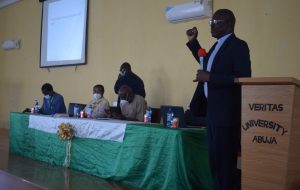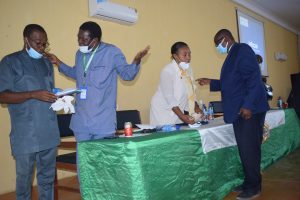Academics in Nigeria who think that high number of publications is all there is to it in terms of becoming a Professor had better rethink. This is because that has been ruled out as inadequate to making the professorial rank if it is not also accompanied by teaching in a manner that is considered innovative as well as community service.
According to Prof Hyacinth Ichoku, the Vice-Chancellor of Veritas University, Abuja, who dispensed with this dosage of home truth, innovative teaching and leadership in service delivery are equally important components considered in promotion to the rank of professorship. He defined leadership in community service as involvement of the typical academic in committees in his or her university as well as in the larger community.

Prof Ichoku on the podium
Prof Ichoku’s statements came as preface to his presentation on “Developing the Background to the Study in Research” at a one-day seminar on research Methodology organised by the university’s Directorate of Research and International Linkages, (DRIL). The seminar initially thought to be no more than a routine wrestling exercise with the troublesome domain of research methodology, however, turned high profile when the programme of event showed the Vice-Chancellor himself as a speaker, his predecessor, Prof Mike Kwanashie as chairperson of the occasion, another former Vice-Chancellor of a federal university as another speaker and the Dean of Veritas University’s Postgraduate School, Prof Gabriel Egbe also as speaker, thereby transforming the internal affair into an all-involving exercise.
Although Prof Ichoku recognised research as what makes a university rather than teaching alone, he also argues that high number of publications without the other components would still disqualify a contender. Other than that, he would want academics to note that research is at the heart of the career. “If you are not researching, you won’t get promotion”, he stated, adding that the universities that get mentioned as the models are those researching and publishing. But, for publishing, the VC has in mind high impact journals, not what he derisively calls ‘Bwari Journal of this or that’, a reference to non-descript, backwater stuff craftily put together by promotion seeking academics that is in vogue nowadays.
The VC’s share of the speaking time came with its own moments and spectacle. One was the recognition that all two former Vice-Chancellors on the high table bear the same name – Mike. These were Mike Kwanashie and Mike Adikwu. While Kwanashie was VC of Veritas University, Abuja, Adikwu was VC of the University of Abuja. Prof Ichoku used Adikwu to exemplify the idea of a highly published academic.
The spectacle was the protocol between former and incumbent VCs. Each of the former VCs stopped at the incumbent VCs sit on their way to the high table while the incumbent VC had his own way of deferring to them. Unfortunately, the cameras missed that.
The spectacle formed the lighter side of what Dr. Basil Ekot, the Director of DRIL promises would not be a one off event but an occasion providing “opportunity for valuable intellectual exchanges that will not only continue in departments and faculties across our campus but will serve as a catalyst that will strengthen our knowledge base, equip us with the ability to lead teams that will secure ground breaking grants and conduct research that will be celebrated globally”. Interestingly, Prof Kwanashie, the Chairperson of the occasion, associated himself with what Dr. Ekot had to say.
Set at such high, ambitious pitch, it was no surprise seeing the resource persons on parade to wrestle with research methodology. For after Prof Ichoku came Prof Adikwu who took over the session from Prof Ichoku and spoke on “Literature Review in Research”, then Prof Gabriel Egbe who spoke on “Plagiarism in Research” and the last, Dr. Chika Eze who led on “Data Analysis in Research”.

Prof Egbe, (2nd left), Dr. Chika Eze in conversation with Dr Ekot, Director of DRIL, (backing the camera)
Without going into details of the specialized presentations, a point about each of the last two presentations is worth noting. Dr Eze mentioned discourse analysis in relation to qualitative analysis which was an interesting departure from the naturalization of neopositivism in discussions on research methods in much of academia in Nigeria. That is not unique to Nigeria but it is perhaps more in Nigeria that academics most equate neopositivism with the entire notion of research. And even when research techniques such as discourse analysis, Focus Group Discussion, Process Tracing, Snowballing, etc are ever mentioned, they are never accompanied by the metatheoretical back-up that makes them meaningful in context. So, many on the floor who not only heard her listing discourse analysis but also her clarification about the many models of discourse analysis there are were understandably excited. Unfortunately, unlike Prof Egbe, Dr. Chika’s power points were tiny and not much of the elaboration was captured.
The last is Prof Egbe whose treatment of “Understanding and Prevention of Plagiarism” attracted many questions, perhaps understandably. The typeface, the structural flow and his domestication of topic were all fascinating as well as provocative. But the questions did not touch on what is already a controversy in pedagogy in other quarters. It is in his advocacy for teaching students academic reporting verbs and similar skills so that the average students can effortlessly convey other people’s ideas without failing to credit original sources of such ideas. The question he provokes is whether mastery of academic reporting verbs can replace epistemological grounding in terms of escaping plagiarism. Most critics would say that a student who has no idea of the debate on the question of “how do you know that you know” cannot even trace any ideas to any sources because he or she is not aware of the contending sources. In other words, can academic reporting verbs help if the structure of the courses do not include the ‘philosophy of science question’ especially in the social sciences?
By ‘philosophy of science’ here is meant the debate on what constitutes secure knowledge. Every source has his or her place in that debate. Right now, Immanuel Kant has emerged the winner of the three centuries debate by saying the human constitution is imbued with innate categories such as space and time that can tell us what is true or untrue. It is still not everyone who agrees with him but his legatees are determining much of the academic agenda, sitting on bigger budgets and controlling much of the rising journals. How far can academic reporting verbs and such skills help if the Kantian gaze, for instance, is not part of the knowledge structure in our clime today?
This is probably part of the theme that might capture the attention of the eggheads in DRIL when they come around next time. Certainly, DRIL’s first strike has been a successful strike, both in terms of resource persons and issues put on the table!




























